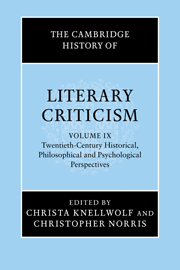Book contents
- Frontmatter
- Introduction
- HISTORY
- MARXISM AND POST-MARXISM
- FROM CULTURAL POETICS TO CULTURAL STUDIES
- PSYCHOANALYTIC APPROACHES
- GENDER AND SEXUALITY
- COLONIALISM, POST-COLONIALITY, NATION AND RACE
- MODERNITY AND POSTMODERNISM
- PHILOSOPHY, AESTHETICS AND LITERARY CRITICISM
- 23 Words and things in phenomenology and existentialism
- 24 Criticism, aesthetics and analytic philosophy
- 25 Italian idealism
- 26 Spanish and Spanish American poetics and criticism
- 27 American neopragmatism and its background
- 28 Ethics and literary criticism
- INTERDISCIPLINARY APPROACHES
- Bibliography
- Index
- References
28 - Ethics and literary criticism
from PHILOSOPHY, AESTHETICS AND LITERARY CRITICISM
Published online by Cambridge University Press: 28 March 2008
- Frontmatter
- Introduction
- HISTORY
- MARXISM AND POST-MARXISM
- FROM CULTURAL POETICS TO CULTURAL STUDIES
- PSYCHOANALYTIC APPROACHES
- GENDER AND SEXUALITY
- COLONIALISM, POST-COLONIALITY, NATION AND RACE
- MODERNITY AND POSTMODERNISM
- PHILOSOPHY, AESTHETICS AND LITERARY CRITICISM
- 23 Words and things in phenomenology and existentialism
- 24 Criticism, aesthetics and analytic philosophy
- 25 Italian idealism
- 26 Spanish and Spanish American poetics and criticism
- 27 American neopragmatism and its background
- 28 Ethics and literary criticism
- INTERDISCIPLINARY APPROACHES
- Bibliography
- Index
- References
Summary
No single concept has had a more vital, complex and uncertain relation to literary criticism than ethics. While criticism has long been felt to represent in part an ethical enterprise, the origin and nature of the ethical obligation binding criticism has been a matter of great uncertainty. In part, this uncertainty reflects at a distance a parallel uncertainty concerning the relation of literature to ethics; in part, it is a feature of the practice of criticism or scholarship in any field; and in part it derives from the discourse of ethics itself.
While there are many different strands of ethical thinking, including those grounded in the thought of Aristotle, Augustine, Kant, Hegel, Marx, Nietzsche, Freud, John Rawls, Michel Foucault, Jacques Lacan, Jacques Derrida and others, a few very general statements can apply to all. Ethics is a way of putting things in which a given concept or term is set in relation to another concept or term in such a way that each exerts pressure on the other. In ethical discourse, ‘inclination’ might be set against ‘duty’, ‘self-interest’ against ‘altruism’, ‘law’ against ‘custom’, ‘long-term interests’ against ‘shortterm desires’, ‘facts’ against ‘values’; such oppositions become ‘ethical’ when they are seen to constitute a relation of ‘otherness’ in which the two terms are defined in mutual resistance.
The disputes arising from such a relation can only be settled by the imposition of an ‘ought’: one ought (for example) to behave out of respect for the law rather than simply pursuing the pleasures of the moment because, for whatever reason, adherence to the law possesses a higher value than the pursuit of pleasure.
- Type
- Chapter
- Information
- The Cambridge History of Literary Criticism , pp. 371 - 386Publisher: Cambridge University PressPrint publication year: 2001
References
- 1
- Cited by

